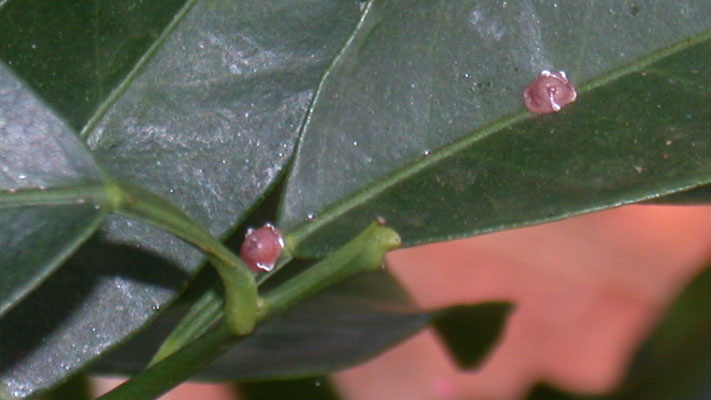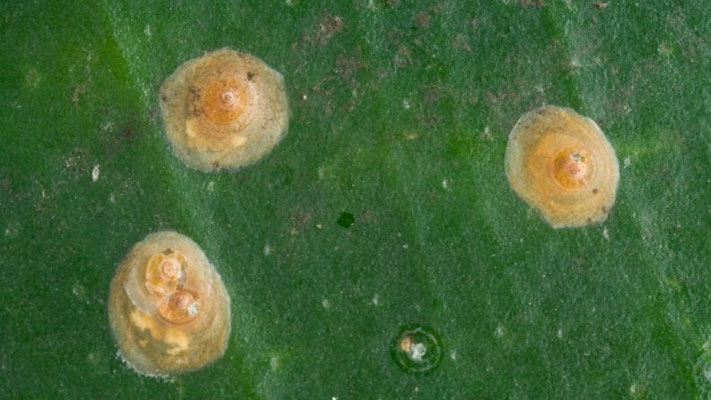Scale
Parthenolecanium persicae (Grapevine scale), Lepiddosaphes beckii - (Mussel scale), Ceroplastes rubens (Pink wax scale), Aonidiella aurantia - (Red scale), Quadraspidiotus perniciosus - (San Jose scale), Coccus hesperidum - (Soft brown scale)
There are more than 20 families of scale including hard (armoured) scale, soft scale, mealybugs and felt scales. Whilst all scale insects are sap sucking, a large amount of diversity exists between species. Soft scales do not have a separate protective cover, in contrast the protective cover in hard scales is not attached to the soft insect body. They infest a large group of host plants including citrus, mangoes, passionfruit, pome fruit, stone fruit, ornamentals and grapes. The term scale refers to the coating over the back of the insect.
Refer to links below for more information on different scale species.
Refer to links below for more information on different scale species.

Scale in grapes
Description
Female adults are sack-like with non-functioning legs or no legs at all. They lack a recognisable head, are wingless, usually sedentary, are long living and their main role is to lay eggs. Males (when they occur) are smaller and appear similar to whiteflies or gnats, they are non-feeding, short lived and possess one pair of wings. Their main role is to mate with females, although some species lay eggs without mating.Some species lay live young, however eggs are more typically laid under the female and hatch as crawlers, which are mobile and feed on plants. The crawlers develop a waxy covering which is shed, this process can repeat up to three times before adults develop.
Scale feed on and damage growing shoots, leaves and fruit. Infestations can result in;
- Reduced growth rates
- Appearance of water stressed plants
- Yellowing leaves and leaf drop
- Dieback of stem (in severe cases)
- Distorted fruit, and skin can become blemished.
Control
Management of scale should focus on prevention rather than control by implementing the following;- Plant scale free stock
- Practice good crop/orchard hygiene e.g. removal of infested plants from growing areas, disinfecting pots etc
- Encouraging beneficial predators by controlling ants and minimising insecticide use
- Monitoring crops for presence of honeydew and scale infestations
- Avoid movement of infested plant material within growing areas.
Movento®, Confidor® 200 SC and Confidor Guard are all compatible with an integrated pest management (IPM) system. Movento is registered for scale control in citrus, grapes, mangoes, passionfruit and pome fruit, Confidor 200 SC for scale control in ornamentals and Confidor Guard for scale control in ornamentals and citrus.
References
Department of Primary Industries and Regional Development (DPIRD) ( 2018), ‘Aphids, mealybugs and scale’, https://www.agric.wa.gov.au/control-methods/aphids-mealybugs-and-scales?page=0%2C2Manners, A (2016), ‘Scale insects. A difficult problem that can be managed’, Horticulture Innovation Australia, https://www.horticulture.com.au/globalassets/hort-innovation/resource-assets/ny15002-scale-insects-pest-mgmt-plan.pdf
Kabashima, J, Dreistadt, S (2014) ‘ Scales’, Pest Notes, University of California, Publication 7408, http://ipm.ucanr.edu/PMG/PESTNOTES/pn7408.html









